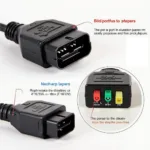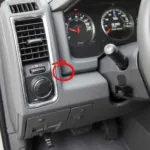OBD2, which stands for On-Board Diagnostics, generation two, is the standardized system used to diagnose issues in vehicles. It’s been the standard in the United States since 1996, so if your vehicle was manufactured after that, it’s most likely already equipped with an OBD2 system. However, if you have an older vehicle, you might be wondering, “Should I update to OBD2?”
Understanding OBD2 and Its Benefits
Before deciding if an update is right for you, it’s crucial to understand what OBD2 is and the advantages it offers.
At its core, OBD2 is like a common language your car uses to communicate with diagnostic tools and, more importantly, with you. When something goes wrong, your car’s computer system stores a specific code in its memory. This code corresponds to the detected issue.
An OBD2 scanner, even a basic one, can read these codes and tell you what’s happening. Think of it as translating your car’s warning lights into plain English (or any language, for that matter!).
Benefits of Updating to OBD2:
- Improved Diagnostics: OBD2 offers more detailed and accurate diagnostic information compared to older systems.
- Early Problem Detection: This allows for quicker and easier identification of potential issues, often before they become major headaches.
- DIY Repairs: With an OBD2 scanner and a little research, you can often diagnose and even fix minor car problems yourself, potentially saving you significant money on mechanic fees.
- Increased Control: OBD2 gives you greater transparency and control over your vehicle’s maintenance and repair needs.
Is Updating to OBD2 Possible for Older Cars?
Now, here’s the tricky part: you can’t technically “update” an older car to OBD2 in the same way you’d update your phone’s software. If your vehicle wasn’t manufactured with OBD2, it doesn’t have the necessary onboard computer system to support it.
Alternatives for Older Vehicles
While a full OBD2 update might not be feasible for pre-1996 models, there are still options to access some diagnostic benefits:
- Aftermarket OBD2 Scanners: Some advanced scanners are designed to work with a wider range of vehicles, including older models. These scanners may not offer the full range of OBD2 functionality but can still provide valuable diagnostic information.
- Consult a Specialized Mechanic: Mechanics specializing in older cars may have tools and expertise to access basic diagnostic information, even on vehicles without OBD2.
Making the Right Choice for Your Car
Ultimately, the decision of whether to seek out OBD2 capabilities for an older car depends on various factors:
- Your Car’s Make and Model: Some older vehicles might have limited aftermarket OBD2 solutions available.
- Your Budget: Aftermarket scanners vary in price, and consulting a specialized mechanic can also be costly.
- Your DIY Skills: If you enjoy working on your car and are comfortable with basic repairs, an OBD2 scanner can be a valuable investment.
Conclusion
While updating to OBD2 isn’t an option for vehicles manufactured before 1996, understanding its benefits and exploring alternatives can empower car owners with older models. By staying informed and considering the available options, you can make the best decision for your car and your budget.
FAQs
1. What is the difference between OBD and OBD2?
OBD refers to the first generation of onboard diagnostics, while OBD2 is the second and current generation. OBD2 offers more standardized protocols, broader diagnostic capabilities, and greater data accessibility compared to its predecessor.
2. Can I install an OBD2 port in my older car?
Installing an OBD2 port in an older car that didn’t come equipped with one is not a simple plug-and-play process. It requires extensive modifications to the vehicle’s electrical and computer systems, which can be complex and costly.
3. Where can I find a reliable mechanic specializing in older cars?
You can start by asking for recommendations from friends, family, or local car enthusiasts. Online directories and forums dedicated to classic or vintage cars can also provide valuable insights and connect you with reputable mechanics in your area.
4. Are there any risks associated with using OBD2 scanners on older cars?
While rare, there’s a slight risk of compatibility issues when using OBD2 scanners on older vehicles, especially those not specifically designed for them. Always double-check compatibility before connecting any diagnostic tool to your car’s system.
5. What are some reputable brands of OBD2 scanners for older cars?
Some well-regarded brands known for producing scanners compatible with a wide range of vehicles, including older models, include Innova, Autel, and BlueDriver.
Need further assistance or have more questions about OBD2 and your vehicle? We are here to help! Reach out to our team of automotive experts via WhatsApp at +1(641)206-8880 or email us at [email protected]. We offer 24/7 support to answer your queries and guide you toward the best solutions for your car’s diagnostic needs.

